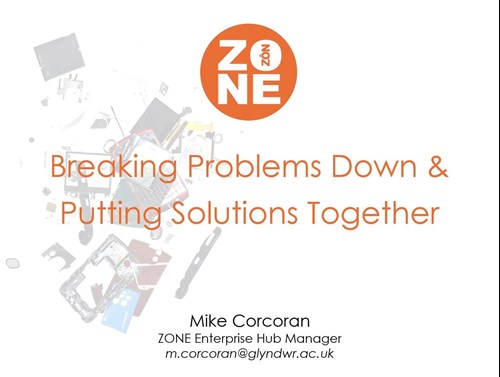Group Size
?
1.) Small group (teams of 4-6)
2.) Individual Task
3.) Large Group
4.) Any
Any
Learning Environment
?
1.) Lecture Theatre
2.) Presentation Space
3.) Carousel Tables (small working group)
4.) Any
5.) Outside
6.) Special
Carousel Tables (small working group)
QAA Enterprise Theme(s)
?
1.) Creativity and Innovation
2.) Opportunity recognition, creation and evaluation
3.) Decision making supported by critical analysis and judgement
4.) Implementation of ideas through leadership and management
5.) Reflection and Action
6.) Interpersonal Skills
7.) Communication and Strategy
1Creativity and Innovation
2Opportunity recognition‚ creation and evaluation
5Reflection and Action
A large proportion of students from Glyndwr University’s Complementary Medicine Degree Programmes pursue self-employment upon graduation. As such, all seek to develop their enterprising and entrepreneurial skills as they study, to best equip them for their future endeavours. Effective identification and implementation of problem solving strategies, alongside adeptness at seeking out new opportunities, is essential to this.
A number of students from various complementary therapies courses attended an extra-curricular workshop on ‘Breaking Problems Down and Putting Solutions Together.’ This session was facilitated by ZONE Enterprise Hub – the University’s student enterprise support service.
The workshop was delivered from a small classroom, and ran for approximately 90 minutes, followed by an extended, informal 30 minute question and answer session. 10 individuals attended the session, inclusive of graduates, and students of various levels of study (including individuals from programmes other than health). The group were of mixed ability, but a number of individuals were already working as complementary medicine practitioners, or had previous experience of running their own enterprises (with a large proportion of the audience being mature students).
The workshop followed the format as outlined in the How To Guide ‘Workshop: Breaking Problems Down and Putting Solutions Together,’ a link to which can be found in the resources section of this document.

The session began with an introduction to the themes which would be covered, followed by an opportunity for each individual in the group (in virtue of its small size) to relay their own experience of enterprise, and future career ambitions. This allowed for the session to be directed specifically to the needs and interests of the group thereafter.
The first half of the workshop focussed on the solutions to problems (and opportunities) that the group already had at their disposal. The audience were asked to identify their own skills, and how each of these skills related to a product or service they were able to supply, before relaying these to the rest of the group. Talking publically about their skills and abilities proved something that a number of the group were unfamiliar with, with some finding the exercise challenging to do. However, the whole group here demonstrated strong peer support, supporting, complementing, and encouraging one another.
Next, the group were offered a problem solving case study. The case of Physicist Richard Feynman’s prize winning development of Quantum Electro Dynamics was shared. This stimulated conversation regarding other instances of problem solving amongst the group.
The second half of the workshop focussed on how problems can be broken down. The group were presented with a particularly challenging problem as an example (a question from a job interview for a position with Google), which collectively, they broke down into a series of smaller problems, before solving each one in turn. They were then asked to reflect on problems they had encountered in their own studies, lives, or professional practice, and do the same. Having done this, the group were then asked to reflect of each of the skills, products and services they had earlier identified, and relate how each could contribute to solving the problems they encountered.
One individual offered a problem she was personally concerned about for group discussion. In her work, she dealt with young people, and vulnerable adults, and had concern regarding what would happen if someone suffered a serious personal injury in her workplace.
As a group, this problem was broken down into a series of smaller problems (including – policies and procedures that need to be in place, first aid training that needs to be undertaken, contact details that need to be available, risks assessments that need to be written etc.). Having done this, we establishedthat the vast majority of the scenario was already well accounted for by the individual, and what presented itself as a major concern, could actually be resolved by addressing only a few minutiae.
The workshop concluded with a re-cap of the key themes which had been covered, followed by an extended question and answer sessions where the group shared ideas and experiences with one another.
The session had a positive impact on all those who attended. It allowed individuals to reflect of the wide range of skills at their disposal, to appreciate the numerous things these skills empower them to do, and appreciate that the problems they would encounter in their future professional practice would not be insurmountable.
It equipped them with strategies to tackling problems and identifying opportunities in the future, and all reported finding the session beneficial to their development.
For many of the learners, the session was their first experience of reflecting exclusively of problems solving strategies and techniques and resultantly, it was the first opportunity for many, to apply these ideas directly to their own work and study.
Several of the group reported speaking publicly and confidently about their skills and abilities to be challenging, something which could hold them back in their studies and their career. The workshop environment provided a safe place to practice this ability, and the supportive nature of the group served to develop the confidence and self-belief of all of the participants.